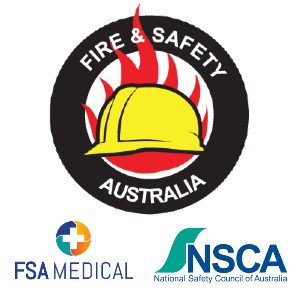Confined Space Training Perth
Acquiring knowledge and practical skills to conduct work in confined spaces is crucial for individuals and teams working in this high-risk environment. At Fire and Safety Australia we provide premier solutions for confined space training in Perth. Catering to the mining sector and diverse industries throughout Western Australia, we’re proud to offer industry-leading training, both on-site and at our dedicated Perth facilities.
In addition to our Perth confined training courses we also offer a range of training in Work Permits, Gas Atmosphere Testing, and the operation of Respiratory Protection Equipment.
Learn more about each course and book online by clicking on the images below.
Our Confined Space Training Courses
Enrol in our Perth confined space training courses to equip your team with practical skills for safe and confident work in confined spaces. Our courses align with confined space legislation and provide hands-on training in essential areas such as breathing apparatus usage, hazard identification, etc. Gain the expertise needed to navigate confined spaces effectively and ensure the safety of your workforce.
Confined Space Entry
Our Perth confined space courses are designed for individuals involved in tasks within or near confined areas. Successful completion of these courses provide comprehensive training to equip you with the necessary skills to effectively manage confined space safety tools, conduct assessments of potential hazards and risks, authorise work permits, and more. Our training centre in Perth is equipped with state-of-the-art facilities, and we also offer flexible learning options and group training sessions on-site.
Confined Space Rescue
Acquire the necessary expertise and hands-on training to effectively rescue individuals from confined spaces while adhering to the Australian Standard 2865-2009 and Work Health and Safety (WHS) Regulations. This course is suited to emergency response team members and on site safety personnel.
Custom Group Training Courses at Your Location
Looking for customised confined space training in Perth? Our expert trainers can cater to large groups and deliver tailored programs and practical exercises to meet your specific requirements. Whether you prefer training at our Perth facility or need on-site sessions at your workplace anywhere in Western Australia, we’ve got you covered. With our flexible approach, you can ensure your team receives the necessary skills and knowledge to work safely and confidently in confined spaces. Contact us to discuss your training needs and schedule a session that suits you best.
FAQ’s
What are the risks associated with working in confined spaces?
The risks associated with confined spaces and excavation work are diverse and encompass various potential hazards.
- Limited entry and exit points can make it difficult to escape in case of an emergency.
- Hazardous atmospheres, such as those that are flammable, toxic, irritant, or corrosive, pose a significant risk to workers.
- Engulfment and entrapment hazards can occur in confined spaces and excavations, leading to serious injuries or fatalities.
- Temperature extremes, both hot and cold, can also create risks for workers.
- Falling objects pose a threat to workers’ safety, especially in areas with overhead hazards.
- Mechanical hazards, such as machinery or equipment, can cause injuries if not properly controlled.
- Noise and vibrations in confined spaces can have detrimental effects on workers’ health.
- Communication challenges may arise due to limited visibility or the use of personal protective equipment.
- Lack of visibility can make it difficult to navigate and identify potential hazards.
Chemical exposure is a concern in confined spaces where hazardous substances may be present. - Structural instability can be a significant risk in confined spaces and excavation sites, increasing the likelihood of collapses or cave-ins.
How can I identify a confined space?
Confined spaces are areas that are enclosed or partially enclosed, have limited entry and exit points, and are not designed for continuous occupancy. They may also have a risk of engulfment or a hazardous atmosphere.
Here are some examples of confined spaces:
- Underground storage tanks: These are large containers used to store substances such as fuel or chemicals. They often have limited entry and exit points and can pose risks of hazardous atmospheres due to the stored substances.
- Sewers and manholes: These are underground structures used for the maintenance and repair of sewer systems. They have limited entry and exit points and can contain hazardous atmospheres, such as toxic gases or lack of oxygen.
- Silos and grain bins: These are enclosed structures used for storing agricultural products, such as grains or feed. They can have limited entry and exit points and may contain hazardous atmospheres due to the presence of dust or gases.
- Boiler rooms: These are enclosed areas where boilers and other heating equipment are located. They often have limited access points and can pose risks of high temperatures and hazardous atmospheres.
What precautions should be taken when working in confined spaces?
Precautions include conducting hazard identification, monitoring hazardous materials and atmospheres, using a confined space entry permit, ensuring appropriate signage, having a standby person, using effective communication methods, and providing training for workers.
How long should records of training for confined space work be kept?
Records of all training provided to workers in relation to confined space work must be kept for two years.
How can I reduce the risk of injury or illness when working in confined spaces?
To reduce the risk, it is important to identify confined spaces and assess the risks associated with them. This can be done by undertaking hazard identification and implementing appropriate control measures.
Does confined space training expire in Western Australia?
Australian Standard AS2865-2009 stipulates that any workers engaging in confined space operations should update their qualifications every two years, but may need to update more or less frequently depending on the type of work undertaken.
At Fire and Safety Australia, we offer a confined space entry refresher course which offers streamlined training for individuals who have previously obtained confined space certification.

